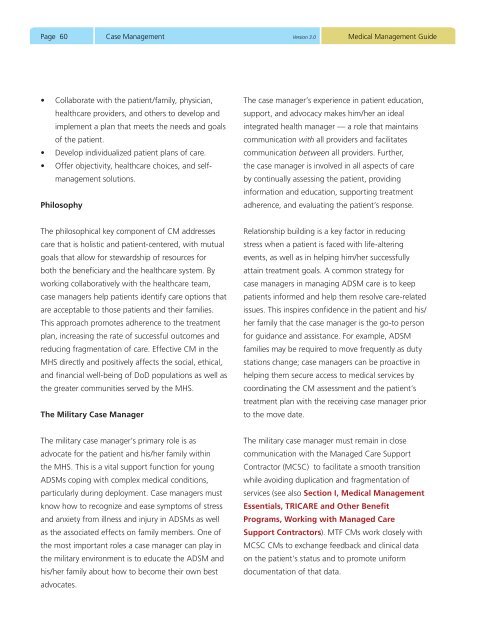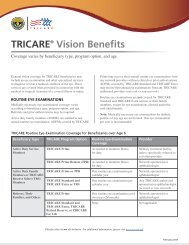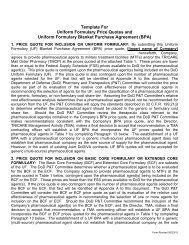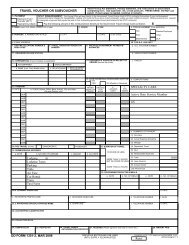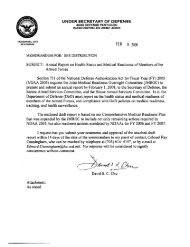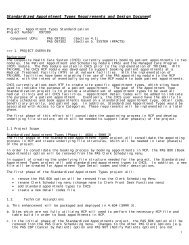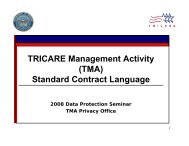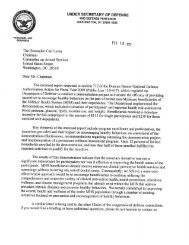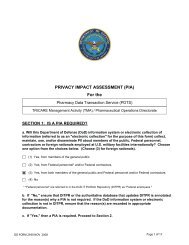Medical Management Guide, 2009, Version 3.0 - Tricare
Medical Management Guide, 2009, Version 3.0 - Tricare
Medical Management Guide, 2009, Version 3.0 - Tricare
- No tags were found...
Create successful ePaper yourself
Turn your PDF publications into a flip-book with our unique Google optimized e-Paper software.
Page 60Case <strong>Management</strong> <strong>Version</strong> <strong>3.0</strong><strong>Medical</strong> <strong>Management</strong> <strong>Guide</strong>• Collaborate with the patient/family, physician,healthcare providers, and others to develop andimplement a plan that meets the needs and goalsof the patient.• Develop individualized patient plans of care.• Offer objectivity, healthcare choices, and selfmanagementsolutions.PhilosophyThe case manager’s experience in patient education,support, and advocacy makes him/her an idealintegrated health manager — a role that maintainscommunication with all providers and facilitatescommunication between all providers. Further,the case manager is involved in all aspects of careby continually assessing the patient, providinginformation and education, supporting treatmentadherence, and evaluating the patient’s response.The philosophical key component of CM addressescare that is holistic and patient-centered, with mutualgoals that allow for stewardship of resources forboth the beneficiary and the healthcare system. Byworking collaboratively with the healthcare team,case managers help patients identify care options thatare acceptable to those patients and their families.This approach promotes adherence to the treatmentplan, increasing the rate of successful outcomes andreducing fragmentation of care. Effective CM in theMHS directly and positively affects the social, ethical,and financial well-being of DoD populations as well asthe greater communities served by the MHS.The Military Case ManagerRelationship building is a key factor in reducingstress when a patient is faced with life-alteringevents, as well as in helping him/her successfullyattain treatment goals. A common strategy forcase managers in managing ADSM care is to keeppatients informed and help them resolve care-relatedissues. This inspires confidence in the patient and his/her family that the case manager is the go-to personfor guidance and assistance. For example, ADSMfamilies may be required to move frequently as dutystations change; case managers can be proactive inhelping them secure access to medical services bycoordinating the CM assessment and the patient’streatment plan with the receiving case manager priorto the move date.The military case manager’s primary role is asadvocate for the patient and his/her family withinthe MHS. This is a vital support function for youngADSMs coping with complex medical conditions,particularly during deployment. Case managers mustknow how to recognize and ease symptoms of stressand anxiety from illness and injury in ADSMs as wellas the associated effects on family members. One ofthe most important roles a case manager can play inthe military environment is to educate the ADSM andhis/her family about how to become their own bestadvocates.The military case manager must remain in closecommunication with the Managed Care SupportContractor (MCSC) to facilitate a smooth transitionwhile avoiding duplication and fragmentation ofservices (see also Section I, <strong>Medical</strong> <strong>Management</strong>Essentials, TRICARE and Other BenefitPrograms, Working with Managed CareSupport Contractors). MTF CMs work closely withMCSC CMs to exchange feedback and clinical dataon the patient’s status and to promote uniformdocumentation of that data.


